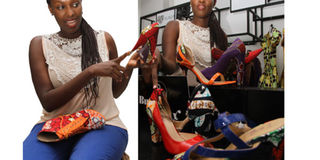Shoes made from African print

Elamin Nuba displays some of the company’s shoe brands. photos by Abubakar Lubowa.
What you need to know:
Buqisi Ruux is a shoes brand that capitalises on African print. Gillian Nantume sat with Elamin Nuba and Lyn Bugaari, two of the company’s proprietors, to discuss challenges, future plans and the current status of the business.
Talking about shoes evokes excitement out of Elamin Nuba and clearly as we get into the interview, I notice this is beyond passion but a lifeline.
From the gloomy prospects of unemployment, Nuba plunged into the murky world of business after relocating to Nairobi from Liberia.
“I had relocated to Nairobi in 2012, from Liberia, where I had been working with ADRA, a non-government organisation,” she says.
“I linked up with my cousin, Lyn Bugaari, who had just completed her degree in human resource from a university in South Africa. We were both jobless, and frustrated.”
The two had taken their parents’ advice of studying hard, in the hope of getting employment. However, nothing ever came forth.
“Our only consolation was the gym, where we worked out to pass time,” Nuba says.
Starting out
Things seemed hard after the expiry of our membership at the gym, as the attendant had denied us entry.
“So from then we decided that we do something about the situation,” Nuba says.
“I had always had an obsession for shoes. The more we discussed making shoes, the more we realised there was a gap in the market… and that morning saw the birth of Buqisi Ruux.”
The high-heel shoes market is flooded with cheap Chinese products, which in August 2013 forced the two young ladies to embark on a journey of making shoes locally.
Around that time, Lyn’s sister, Tetsi Bugaari, joined them. “She came on board as a creative designer. All the shoes are her designs,” says Nuba. “By 2014 we were ready with the designs and had procured the raw material.”
However, this was not without challenge as “we could not find any factory within Nairobi or Addis Ababa to manufacture our designs.”
“However, we finally found a factory in China that allowed in May 2014 to work according to our specifications and quality standards,” Nuba says.
The three young ladies are spread in different countries with their business unit - Buqisi Ruux registered in Kenya.
Lyn Bugaari, who is based in Kenya, runs the Nairobi franchise with Nuba running that of Uganda. Tetsi Bugaari is still studying in South Africa.
The unique names
“Buqisi means ‘queen’ in the ancient Egyptian language and Ruux is a short form for Rukungiri, which is our home district,” says Nuba. “Every shoe under our brand has a name. They are named after women who have influenced us positively. Some of the names are Samali, Katami, Murungi, and JBK.”
Buqisi Ruux has eight styles of shoes, which are designed in African print (kitenge) and in each style there are four different designs.
Initial capital
Although the young entrepreneurs have not yet audited their finances, Nuba believes their initial capital was between $25,000 (Shs74m) and $30,000 (Shs89m).
“Initially, someone had committed to investing in the venture but he pulled out a few weeks before manufacture. After consultations, we called a family meeting to convince our parents to lend us money. At first, they doubted that we would succeed but they finally agreed. We are still repaying the loan,” Lyn Bugaari says.
The average price for a shoe is $100 (Shs298,661) and “at least we sells an average of 20 pairs a month”.
“Some months are better than others,” says Lyn Nuba “but still we are not making much profit because we are repaying the loan.”
Challenges
“We lack internal capacity,” says Lyn Bugaari, adding: “We would like to run our business professionally but we are constrained by funds.”
Spread to other countries, for instance in Nigeria, has also been a challenge due to financial constraints.
“Many times we have had our meetings through Skype and WhatsApp,” says Nuba.
Although Lyn Bugaari says she does not believe they have direct competition, there are a number of other shoe manufacturers in Uganda, who specialise in different areas, like school and company shoes.
Currently, Buquisi Ruux is the only one producing kitengi shoes in bulk, as compared to others who make custom-made print shoes on order.
How they sell the shoes
Elamin Bugaari says because of limited funds, they don’t have their own shops or outlets but make sales through different high-end stores.
“We sell the shoes at Kumg’ara at the Karen Plains Arcade, in Nairobi, and at Bold, at Acacia Mall, in Kampala. We had an outlet in Cape Town at a store called MeMeMe but we had to pull out because of structural differences,” Lyn Bugaari says.
They also hire sales representatives for instance in New York to showcases their shoes at events and pop-up shops. “Our products are also available globally because we use online sales as one of our platforms through our website and social media,” Nuba says.
Shs74m
The amount of money that the young entrepreneurs borrowed from family and friends to inject in the business.
Future plans and advice
“We want to expand to Angola and Nigeria, after reopening our marketing line in Cape Town and Johannesburg, in South Africa,” says Elamin, who strongly subscribes to the company’s long-term goal of opening up a high-heel manufacturing company in East Africa.
Buqisi Ruux also intends to become a strong brand in the international fashion industry internationally.
Advice to young entrepreneurs
The world is changing and there are a lot of opportunities presented through networking, the internet and social media Nuba notes, saying: “Your networking will reflect on the product sales.”
“Entrepreneurs need to go beyond their passion and learn the hard facts about business,” Elamin Bugaari says.




